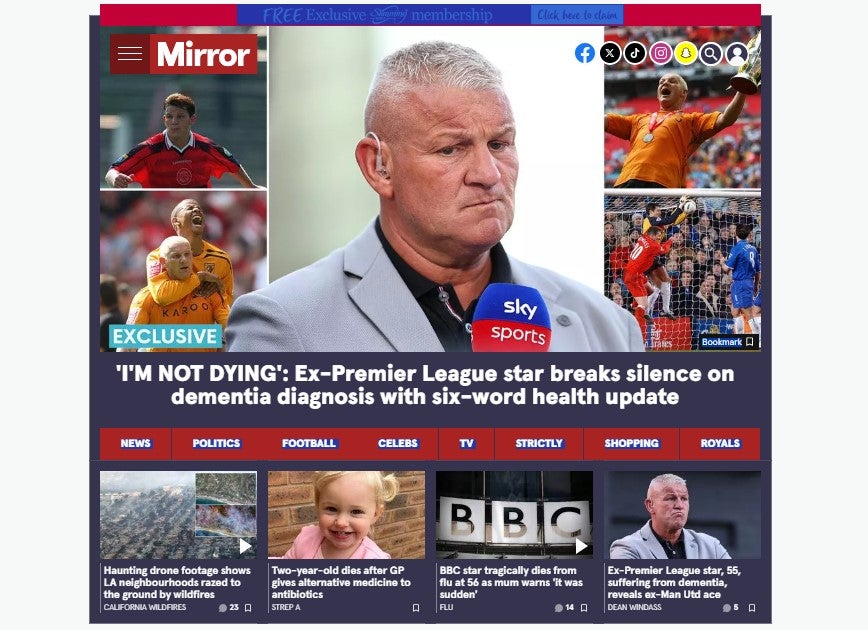
Mirror journalists have been given individual targets for online page views in a move that has raised concerns for some about the potential impact on editorial quality and future job security.
Some journalists whose roles are currently more focused on supporting the print edition are particularly concerned about hitting online page-view targets.
Page views is seen by some as a metric that encourages reporters to produce quickly-written stories with overly sensational headlines about a narrow range of topics (such as the weather and TV) .
In 2015 Wired reported: “The page view notoriously spawned that most reviled of internet aggravations: clickbait. Quality became less important than provocation; the curiosity gap supplanted craft.”
Some argue that returning visitors or dwell time are better metrics to focus on because they encourage a community of returning readers who may ultimately be persuaded to register with a publication or even subscribe. But chief executive Jim Mullen told staff last year: “I need to get the page views. That is the way we sell advertising blocks, and advertising blocks deliver revenue.”
Press Gazette understands that some print specialist reporters covering more serious news fear they will find it hard to hit page-view targets when competing against those writing ‘trending’ content based on the latest viral social media trends.
Editor defends Mirror page-view targets
But Mirror editor-in-chief Caroline Waterston told Press Gazette her journalists have nothing to fear from page-view targets: “The Mirror is a proud tabloid brand and it will always be in its ethos to reach lots of people.
“With that in mind, why shouldn’t we be ambitious for every single story we produce? Of course, some stories will reach millions and others a more modest but still solid number. But we should always aim to have as many people reading and remembering a Mirror story whether that be in print or online. We should want people returning for more of those stories time and time again and we should want them to be staying with us longer.
“I firmly believe Mirror journalists are the best in the business, and that they have the nose for great stories that will find an audience and make a difference. As I often say, a good story is a good story is a good story.”
Mirror reporters have been given personal targets based on previous online performance. Press Gazette understands journalists who fail to hit their targets will be given advice on how to reach them and there is no suggestion there will be disciplinary action.
However, in November long-serving Mirror columnists Miriam Stoppard, Paul Routledge and Polly Vernon were all cut – partly because they were not driving sufficient traffic online.
Page-view targets vary from 250,000 to one million page views per month
Monthly targets for Mirror reporters start at around 250,000 page views per month and vary from journalist to journalist depending on previous performance and the subject matter they are covering. Some are as high as one million page views per month.
Some individuals feel the new page-view targets are unfairly high. One insider said they did not know anyone who had come close to hitting their targets in previous months.
However another Reach source told Press Gazette many journalists have previously met and exceeded their new online targets.
Training and support will be given with one person per desk available to help reporters write headlines that work online.
High-quality Mirror stories that have done well online in recent months include an exclusive interview with a pensioner living in Australia who some think is Lord Lucan (around 100,000 page views) and a report from a court case in Germany involving the Madeleine McCann disappearance (around 200,000 page views).
Page-view targets already in place at Reach regionals
Journalists on the Reach network of local media titles have had page-view targets for several years (albeit collectively, not individually).
One former Reach local editor told Press Gazette they felt journalists at the company focus on page views at the expense of serving their local markets.
The biggest Reach local titles like the Birmingham Mail now serve an audience beyond their region with popular online content that often has no particular local angle – and have vastly expanded their monthly reach as a result.
The Birmingham Live website reached 10.3 million readers per month in November according to the latest Press Gazette ranking. Birmingham itself has a population of just over one million and the wider West Midlands around three million.
Birmingham Live editor Graeme Brown told Press Gazette last year the site’s success was due to writing stories that are popular in its local market which also have national resonance.
Google and Facebook changes have increased pressure on page views
In September, Reach editorial leaders encouraged reporters across its regional network to write more stories in response to unstable referral traffic from Facebook and Google. They were told that page views were the company’s “currency” and that journalists should write a higher volume of stories to achieve higher numbers.
The increased focus on website page views at the Mirror partly reflects the changing readership of the title. The Daily Mirror is losing sales at a rate of around 15% per year and current averages 200,000 copies per day, meaning it is declining by around 50% every five years. The Mirror website had a monthly reach of just over 18 million in the month of November.
But some insiders fear that focus on digital targets could denude the quality of the print edition and so hasten its decline. Print currently accounts for 75% of Reach revenue, helped by rising cover prices – the Daily Mirror cover price has doubled in the last five years to £1.70 per day.
The print edition will also reach a different, older, audience than the website.
Email pged@pressgazette.co.uk to point out mistakes, provide story tips or send in a letter for publication on our "Letters Page" blog
